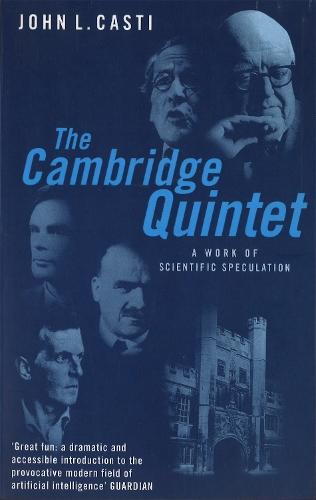Overview
By 1949, the idea of duplicating human thought processes in a computer was starting to surface, as the outgrowth of code-breaking work done by Alan Turing and others in Britain during the Second World War. This ingenious work of speculative scientific fiction reconstructs what might have been said during the animated conversation flowing around Snow's rooms that fateful in Cambridge. The quintet's debate anticipates all of the basic questions which have surrounded artificial intelligence in the fifty years since. Can a machine think or merely process information Is the brain simply a symbol-processing machine, as Turing suggests, and if so, what is the nature of meaning Can there be, as Wittgenstein proposes, no thought without language, and no language without the social interaction of human beings
Full Product Details
Author: John Casti
Publisher: Little, Brown Book Group
Imprint: Abacus
Edition: New edition
Dimensions:
Width: 12.70cm
, Height: 1.20cm
, Length: 20.30cm
ISBN: 9780349108537
ISBN 10: 0349108536
Pages: 208
Publication Date: 03 December 1998
Audience:
General/trade
,
General
Format: Paperback
Publisher's Status: Active
Availability: Manufactured on demand

We will order this item for you from a manufactured on demand supplier.
Reviews
Great fun: a dramatic and accessible introduction to the provocative modern field of artificial intelligence GUARDIAN Casti has organised a satisfying meal ... when the party breaks up, and Schrodinger compliments his colleagues on the stimulating nature of their discussion, his sentiments will probably be shared by many readers too THE TIMES These are difficult and important issues and it is to Casti's credit that his book explains them more clearly and concisely than any other I have read Bryan Appleyard, NEW STATESMAN Enthralling, fascinating, Casti not only captures the excitement, but makes the ideas he relates intelligible to the layman. SUNDAY TELEGRAPH Thought-provoking ... Snow himself might well have approved NEW SCIENTIST
'Great fun: a dramatic and accessible introduction to the provocative modern field of artificial intelligence' GUARDIAN 'Casti has organised a satisfying meal ... when the party breaks up, and Schrodinger compliments his colleagues on the stimulating nature of their discussion, his sentiments will probably be shared by many readers too' THE TIMES 'These are difficult and important issues and it is to Casti's credit that his book explains them more clearly and concisely than any other I have read' Bryan Appleyard, NEW STATESMAN 'Enthralling, fascinating, Casti not only captures the excitement, but makes the ideas he relates intelligible to the layman.' SUNDAY TELEGRAPH
Great fun: a dramatic and accessible introduction to the provocative modern field of artificial intelligence - GUARDIAN Casti has organised a satisfying meal ... when the party breaks up, and Schrodinger compliments his colleagues on the stimulating nature of their discussion, his sentiments will probably be shared by many readers too - THE TIMES These are difficult and important issues and it is to Casti's credit that his book explains them more clearly and concisely than any other I have read - Bryan Appleyard, NEW STATESMAN Enthralling, fascinating, Casti not only captures the excitement, but makes the ideas he relates intelligible to the layman. - SUNDAY TELEGRAPH Thought-provoking ... Snow himself might well have approved - NEW SCIENTIST
A fictional dialogue between five seminal modern thinkers, on the thorny subject of artificial intelligence. Casti (Would-Be Worlds, 1996) postulates that in June of 1949, the British government asks physicist and novelist C.P. Snow to sound out the scientific community on the subject of thinking machines. In response, Snow throws a special dinner at Cambridge for mathematician Alan Turing, geneticist J.B.S. Haldane, physicist Erwin Schrodinger, and philosopher Ludwig Wittgenstein. This book is an account of their imaginary meeting, as well as a portrait of these five remarkable personalities. By 1949, Turing's mathematics had laid the groundwork for the idea of a programmable computer, which he explains to the other guests to begin the discussion. At first, the gruff Haldane acts as the voice of common sense, asking what a simple Turing Machine is actually good for. Schrodinger is quicker to see the mathematical implications, but Wittgenstein questions whether a finite machine can mimic any natural phenomenon at all, let alone one as complex as thought. Over the course of the evening, Turing continues to explain his ideas (including the Turing test ) using various dishes and implements as the dinner progresses, while the urbane Snow acts as host and master of ceremonies. The others offer insights or criticisms of Turing's model, bringing in such familiar concepts as the Chinese room (here recast in terms of hieroglyphics) in which a translator merely manipulates symbols without understanding them; can he be said to think? The holes in the various arguments are exposed, and many of the central ideas of today's artificial-intelligence debates are clearly outlined in these discussions. While Casti's attempts to blend exposition and dialogue are wooden, he does a good job of laying out the key philosophical issues raised by artificial intelligence, and of delineating the thought of these five men. Historians of science will enjoy this imaginary meeting of minds; others may find the fare too esoteric. (Kirkus Reviews)
Author Information
John L Casti is a member of the faculty of the Santa Fe Institute and a professor at the Technical University of Vienna. He is the author of PARADIGMS LOST etc.



